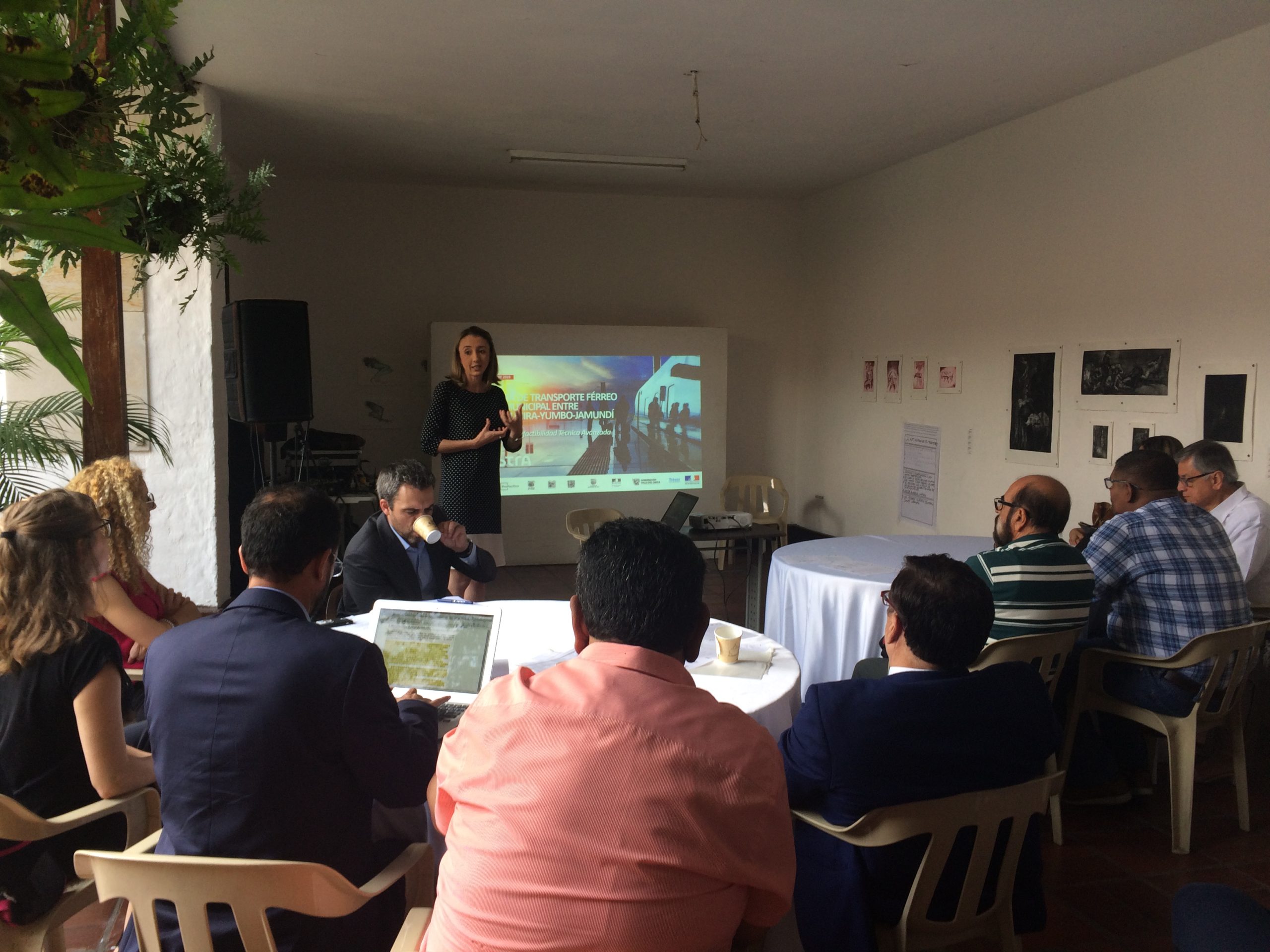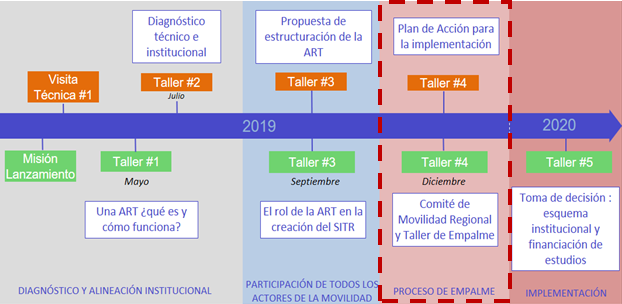[Technical cooperation Colombia] Fourth workshop : towards the implementation of the RTA
In February, CODATU launched a technical cooperation in Cali, Colombia, on metropolitan governance of public transport. In partnership with the French Development Agency AFD (through FEXTE funding), the cooperation aims to support local authorities in the implementation of a « Regional Transport Authority » (RTA) in the metropolitan area of Cali. The cooperation is part of a broader context of strategic mobility projects for the region currently in development supported by the French Embassy in Colombia and the AFD through FASEP and FFEM funding : the local train linking Cali and the neighboring municipalities (the project is currently in prefeasability stage, conducted by SYSTRA) and the « Corredor Verde » project which promotes soft mobilities and urban renovation alongside the railway in Cali.
In 2019, the French Development Agency and Codatu worked with consultants and municipal and regional authorities to structure a Regional Transport Authorities (RTA).
Municipal and regional elections took place in October of 2019. For this reason, it was an important challenge for Codatu to ensure the continuity of the project.
The fourth workshop took place on the 11th and 12th of december, and was organized in two parts :
- The preliminary Regional Mobility Committee: users of public transportation, private bus companies and researchers were invited as representatives of the civil society.
- The transition workshop with current administrations and recently elected municipal and regional representatives who will take office in January of 2020 and lead the implementation phase.
Part 1: Regional Mobility Committee
In parallel with the creation of the future RTA, the region will structure a Regional Mobility Committee, a consultative entity representative of the civil society. Users of public transportation, economic leaders of the territory such as hospitals and universities, and members of the academia experts in transportation, territorial development, economic, environmental, and social sciences. It will aim to socialize the state of progress of the different transportation projects and learn from the knowledge and opinion of the different stakeholders.
Session 1: Presentation of the state of progress of ongoing regional transportation projects
 Systra consultants presented the results of the regional train prefactibility study. Then, DVDH and GSD+ consultants presented the results of the RTA structuration study. Finally, Codatu presented the state of progress of the ongoing activity to write Terms of Reference for the technical structuration study of the Integrated Regional System of Transportation (IRST).
Systra consultants presented the results of the regional train prefactibility study. Then, DVDH and GSD+ consultants presented the results of the RTA structuration study. Finally, Codatu presented the state of progress of the ongoing activity to write Terms of Reference for the technical structuration study of the Integrated Regional System of Transportation (IRST).
Picture: Presentation of the consultant Roberta Dal Sasso (SYSTRA). Source: Codatu
Session 2: Implementation of the new institutions
This session allowed for the participants to give their opinion on the future structure and functioning of the Regional Mobility Committee as well as identify the key stages of implementation of the regional transportation projects where they should be involved and play a role.
Part 2: Transition workshop
Session 1: Results of 2019
Representatives of the municipal and regional governments who actively participated in the process of structuration of the RTA in 2019 gave testimonies of the lessons learned and the decisions taken in 2019. They underlined the importance of creating a regional authority competent on the whole metropolitan territory to plan the system of transportation at the most relevant scale. They also mentioned the necessity of developing an ambitious system of public transportation in order to respond to current challenges: accessibility, attract more users to the public system, ensure financial sustainability of the network, limit congestion. Finally, given the strong interdependencies of the different municipalities of the metropolitan territory, they showed how, by thinking regionally, we can solve punctual local issues of transportation.

Picture: Mobility policies in Palmira. Source: Palmira municipality
Session 2: Results of the RTA structuration study
DVDH and GSD+ consultants presented the results of the structuration study they conducted. It was based on a technical, financial, institucional and legal diagnosis of the regional system of transportation as well as best practices learned from national and international case studies with a special focus on the keys to success in the implementation of regional/urban railroad systems. They showed how important it is to articulate the entities in charge of regulating, planning and managing the system(s) of transportation to develop an integrated multimodal network, and conceive new systems of transportation such as a regional train taking into account the territory and the existent offer of public transportation.
Session 3: Implementation of the RTA
DVDH and GSD+ consultants presented the implementation plan in order to prepare with the future administrations the steps to come in 2020. We agreed on a series of actions to ensures the continuity of the process and define a transitory governance to follow up on the train and IRST projects until the RTA is officially created.
Next steps
Codatu will continue to accompany the new administrations to launch the implementation phase. The new municipalities will have to decide if they want to associated in the RTA project, which will imply to transfer financial resources to the institution and participate in regular meetings to follow up and make decisions of regional transport projects. Additionally, they will decide on the entity which will be in charge of leading the technical studies and the implementation of the train and IRST projects. Codatu will organize a fifth workshop to accompany that decision phase and close the cooperation.

Picture: Four steps of the cooperation. Source: Codatu
